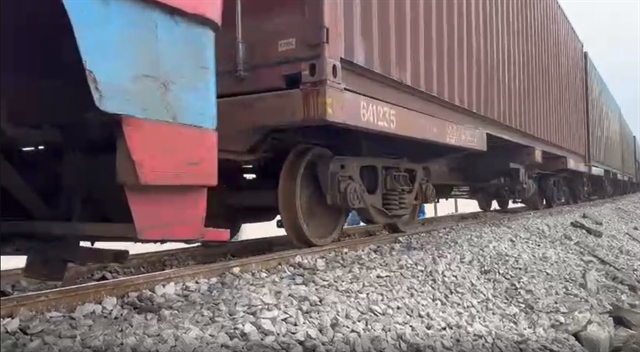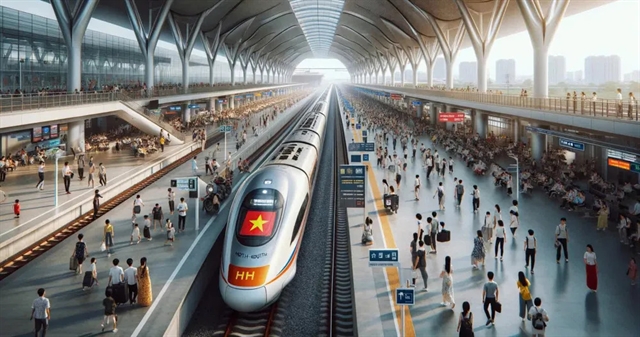 Society
Society

 |
| The VinSpeed High-Speed Railway Investment and Development Joint Stock Company on May 14 officially registered to invest in the North-South high-speed railway project. Photo vtv.vn |
HÀ NỘI — Experts say a resolution on economic development has helped open the door for private sector involvement in key infrastructure projects, especially in high-speed railways and metro lines.
After Resolution 68-NQ/TW on private economy development was issued in May, private enterprises have responded to the Government’s policies on building the North-South high-speed railway.
Vingroup has developed a serious and specific proposal that saw the VinSpeed High-Speed Railway Investment and Development Joint Stock Company officially registered on May 14, to invest in the North-South high-speed railway project.
The project has an investment capital of about VNĐ1.56 quadrillion (about US$61.35 billion), excluding costs for compensation, relocation support and resettlement for site clearance.
Previously, Vingroup also proposed to build a 48.5km metro line (high-speed railway), starting from Nguyễn Văn Linh Street and ending at the Cần Giờ coastal urban tourism project in Cần Giờ District. This metro line is designed to have a speed of 250km per hour, shortening the travel time from HCM City to Cần Giờ to only about 16 minutes.
After Vingroup’s proposal, Trường Hải Group (THACO) on May 26 sent a document to the Government proposing to invest in the North-South high-speed railway project.
According to Trần Bá Dương, Chairman of THACO's Board of Directors, this project is very large in scale and challenging in terms of many specific technologies. Although it does not directly bring profits, the project will help THACO and the Vietnamese business community develop the metallurgical, heavy and precision mechanical, digital, signal and control industries, which help narrow the gap with developed countries.
A special point in THACO's proposal is the orientation for developing the domestic railway industry. With its existing mechanical engineering foundation, THACO will cooperate with domestic enterprises to receive technology transfer and produce locomotives, train cars and operating equipment. It will develop new supporting mechanical industrial parks in Bình Dương và Bắc Ninh provinces.
Regarding capital, THACO will invest in the project with a total capital of about $61.35 billion, of which 20 per cent is its capital and legally raised domestically. The remaining 80 per cent will be borrowed from domestic and foreign credit institutions. THACO proposed that the Government guarantee this loan and support interest for 30 years.
Sovico Group - the founding shareholder of Vietjet Air - has recently also submitted a proposal to participate in researching and investing in the metro line No. 4 from Hóc Môn District to the Hiệp Phước urban area, with a total length of 47.3km.
Trần Quang Lâm, acting Director of the HCM City Department of Construction, said the city aims to complete 355km of metro lines by 2035, and 510km by 2045. With the support of Resolution 68 of the Politburo and Resolution 188 of the National Assembly, HCM City expects to speed up this progress.
According to Lâm, currently, there are many investors interested in the city’s urban railway system and the HCM City People's Committee has welcomed many investors interested in learning about it. Recently, the consortium of Đại Dũng Group, Construction Corporation No. 1 (CC1) and Hòa Phát Group has sent a document to the HCM City People's Committee proposing to participate as the EPC (Engineering, Procurement and Construction) general contractor for urban railway projects in the city. The consortium expressed its desire to conduct research and invest in three key railway lines, including the metro line No. 2 (Bến Thành - Tham Lương), the Thủ Thiêm - Long Thành railway line and the new city of Bình Dương - Suối Tiên line.
According to Associate Professor, Dr. Đặng Thị Thúy Duyên, from the Banking Academy of Vietnam’s Faculty of Economics, opening the way for the private sector to participate in railway projects is an important turning point for the railway industry and road transport. The participation of private enterprises is expected to bring prosperity to the railway industry.
The Ministry of Science and Technology is drafting detailed regulations and guidelines for the implementation of the National Assembly's resolutions on science and technology development, research, application, and technology transfer for railway projects, with many incentive policies for organisations and individuals implementing railway industry development.
Accordingly, enterprises tasked with developing the railway industry are entitled to incentives as high-tech enterprises according to regulations.
Besides, they will be exempt from corporate income tax and import tax on raw materials and components that cannot be produced domestically within five years.
The enterprises will be also exempt from land rent when carrying out science and technology investment projects in high-tech zones for 15 years for investment projects not included in the list of investment incentive sectors, and for 19 years for projects in the list of industries and trades with investment incentives. Meanwhile, projects in the list of industries and trades with special investment incentives will be exempt from all land rent for the entire lease term. — VNS/BIZHUB




